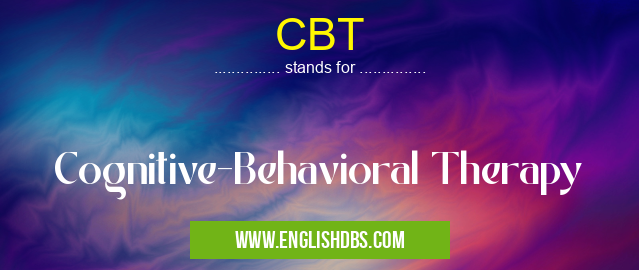What does CBT mean in HOSPITALS
The abbreviation CBT stands for Cognitive-Behavioral Therapy. It is a type of psychotherapy that looks at how our thoughts, feelings, and behaviors interact with each other and how they affect our emotional state. The goal of CBT is to change unhealthy thinking patterns that can lead to negative emotions, self-destructive behaviors, and physical discomfort. This form of therapy has been found to be especially effective in treating anxiety and depressive disorders.

CBT meaning in Hospitals in Medical
CBT mostly used in an acronym Hospitals in Category Medical that means Cognitive-Behavioral Therapy
Shorthand: CBT,
Full Form: Cognitive-Behavioral Therapy
For more information of "Cognitive-Behavioral Therapy", see the section below.
Benefits & Uses of CBT
CBT has been proven as an evidence-based intervention for various conditions such as depression, anxiety disorders, bipolar disorder, posttraumatic stress disorder (PTSD), substance abuse disorder, eating disorders, insomnia etc. Employed both individually or in group settings it offers many benefits such as helping individuals identify distorted thinking patterns which can lead to wrong conclusions about oneself or others; teaching skills on how deal with difficult emotions in a healthy way; offering ways to shift from focusing on the problem towards productive solutions; introducing techniques to manage intrusive thoughts etc.
Essential Questions and Answers on Cognitive-Behavioral Therapy in "MEDICAL»HOSP"
What is Cognitive-Behavioral Therapy?
Cognitive-Behavioral Therapy (CBT) is a type of psychotherapy which focuses on identifying and changing unhelpful thought patterns and behaviors that may be causing distress. The goal is to help individuals develop healthier, more effective coping skills. CBT combines elements of cognitive therapy, which helps people change their thought patterns, and behavioral therapy, which helps people change their behavior in order to achieve desired results.
How does Cognitive-Behavioral Therapy work?
The process of CBT involves a clinician helping an individual identify their current beliefs, emotions, and behavior that they feel are sabotaging or limiting them in some way. Together they will then explore healthier ways to approach these problems including identifying new skills and strategies that can help the individual cope with their issues more effectively. Sessions often involve structured activities such as role-playing scenarios or guided visualization exercises that are designed to bring awareness of automatic thoughts and reactions.
Are there other forms of therapy similar to Cognitive-Behavioral Therapy?
Yes, there are many different forms of talk therapy that can provide similar results as CBT. These include Dialectical Behavior Therapy (DBT), Acceptance and Commitment Therapy (ACT), Interpersonal Therapy (IPT) and Mindfulness-Based Stress Reduction (MBSR). It's important to discuss your treatment goals with a trained therapist in order to determine which form of therapy best suits your needs.
What types of issues can be addressed by Cognitive Behavioral Therapy?
CBT can be used for a variety of mental health issues including anxiety disorders such as panic attacks or phobias, depression, post traumatic stress disorder (PTSD), anger management issues, addiction, eating disorders such as anorexia or bulimia nervosa, personality disorders or obsessive compulsive disorder (OCD). It can also be beneficial for chronic pain management or insomnia.
How long does it take for Cognitive Behavioral Therapy to work?
The length of the treatment depends on the individual’s specific needs as well as the type and severity of their condition. Generally speaking it may take anywhere from 10 to 20 sessions spaced out over several months for noticeable improvement to occur. However research has shown that even relatively brief courses starting at 5 sessions have beneficial effects on mental health symptoms.
What should I expect from a typical session of Cognitive Behavioral Therapy?
During session one most therapists will assess your mental health history, current symptoms, level of functioning in everyday life tasks etcetera before developing an individualized plan catered towards your specific needs. Subsequent sessions focus on teaching new techniques while helping you apply those techniques in real world scenarios so you gradually learn how best utilize them consistently in all areas throughout your life
Final Words:
Cognitive-Behavioral Therapy is an evidence-based practice used by mental health professionals in order to help individuals recognize distorted thinking patterns that can lead to different forms of psychological distress and develop new skills for dealing with life’s challenges more effectively. It has successfully proved its efficacy when used for treating different mental health issues including depression, anxiety disorders and eating disorders among others.
CBT also stands for: |
|
| All stands for CBT |
